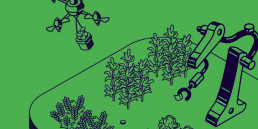The EU-funded project FlexiGroBots is an Innovation Action that envisions the development of a cutting-edge platform for enabling efficient use of novel robotic applications in the agriculture domain and providing multiple benefits to farmers around the world.
FlexiGroBots project, coordinated by the Research and Innovation hub of the Atos Group in Spain and participated by AgriFood Lithuania DIH, has officially completed its first half and achieved promising results focused on the development of a novel open artificial intelligence (AI) platform for building heterogeneous multi-robot systems, as well as inference and data services, which are all being validated in three real-life pilots of significant economic value: grapevines (Spain), rapeseed (Finland) and blueberries (Serbia and Lithuania). Several blueberry and grapevine field tests using ground robots and drones have already been performed successfully, while rapeseed pilot sites in Northern Europe are now ready for the first outdoor trials. All three pilots will mark the second summer of the project with more data collection and validation.
In order to produce solutions that the industry actually needs, collaboration with farmers, robot operators, and consortium partners has been established and information was collected using questionnaires to carefully define a list of functional and non-functional requirements and determine appropriate reference architecture. These requirements follow the General Data Protection Regulation (GDPR) and Ethical, Legal and Socio-Economic (ELSE) principles to ensure portability, interoperability and standardisation. Furthermore, to ensure scalability over multiple use cases and robotic platforms, which is one of the main tasks of the project, the FlexiGroBots platform was designed.
The platform consists of several components:
- AI Platform. Kubernetes-based infrastructure incorporates several virtual machines and a GPU for accelerating model training.
- Common Data Enablers and Services. Minimum Viable Data Space (MVDS) is being developed, incorporating International Data Spaces Association (IDSA) and open-source building blocks. The IDSA connectors will provide interface in-between the components of the complex system.
- Geospatial Enablers and Services. For geospatial enablers and services, an open data cube instance has been deployed in the Spanish pilot. Registration of Sentinel 2 Earth Observation products definition and indexing of data acquired by drones has been achieved, including an instance of the ODC explorer to facilitate data visualization.
- Common Application Services. The first prototypes are available for several services: SLAM, actions recognition, people detection, etc., with data anonymisation being deployed soon. Datasets are being collected and annotated to fine-tune existing models or to develop new ones from or in collaboration with the pilots. Pest detection such as Botrytis or weeds is also an important service.
- Mission Control Centre. A simulation environment is under development for the Mission Control Centre along with a new extension of QGroundControl, which allows the integration of MQTT communication channels between robots, IoT platforms and the MCC.
A template for model cards and datasheets was developed to enable standardised and transparent reporting of the AI model and dataset outputs produced by FlexiGroBots project. Also, discussions with the AI4Europe platforms have been entered to include more transparent reporting standards in the AI4Europe AI asset upload template, which can be used not only by FlexiGroBots, but also other projects.
After releasing the first version of the FlexiGroBots platform in December 2021 with deliverable D3.1, during the last months the project partners have been focused on the development of new functionalities for the different components. The results obtained can be mostly observed in the project GitHub repository where multiple open repositories are available.
In this project, AgriFood Lithuania DIH is the partner and facilitator of the pilot No. 3 (Robotics for high value crop farming) in Lithuania. We are leading dissemination and exploitation part as well as a task on technology transfer and demonstrator roll-out. What is more, we are responsible for coordinating partner efforts and contributing to outreach to stakeholders and potential customers. After the project ends, we will contribute to pilot assessment and exploitation of the results.
For more information, visit: https://flexigrobots-h2020.eu/
Follow FlexiGroBots on Twitter and LinkedIn, and subscribe to its biannual newsletter for more information on the progress and results achieved.
About FlexiGroBots:
FlexiGroBots – Flexible robots for intelligent automation of precision agriculture operations – is an EU-funded project under the Research and Innovation programme H2020 of the European Commission with the Grant Agreement Nº101017111. FlexiGroBots goal is to make multi-robot systems cost-effective for precision agriculture operations by developing a platform able to make them flexible enabling versatility, collaboration, scalability, autonomous capabilities, and in general, ensuring a data economy that facilitates the development of AI-driven capabilities on robots.
For further information about the project, please contact FlexiGroBots Project Coordinator, Francisco Javier Nieto De-Santos, Atos: francisco.nieto@atos.net, and for any media/communication enquiries contact FlexiGroBots Communication Manager, Teodora Knežić, BioSense Institute: teodora.knezic@biosense.rs.


